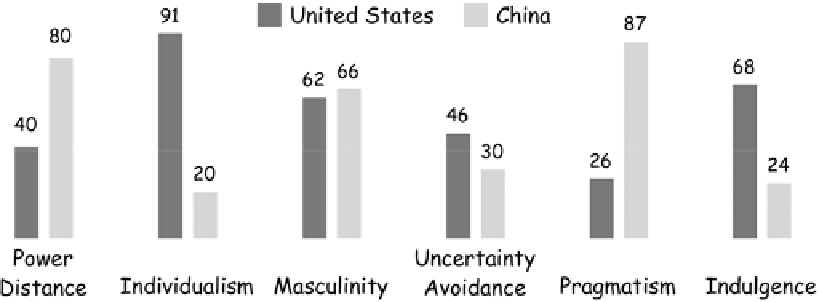Information Technology Reference
In-Depth Information
Figure 4-4. Hofstede's Cultural Dimensions.
Individualism measures interdependence among members. The U.S. is the most individualist so-
ciety in the world. People are expected to look after themselves and their direct family. In con-
trast, China is collectivist with an emphasis less on “I” than “we.” People belong to “in-groups”
that take care of them in return for loyalty and preferential treatment.
Masculine cultures are driven by competition, assertiveness, and material success, whereas fem-
inine societies like Sweden and Norway value cooperation, modesty, caring for the weak, and
quality of life. Both the U.S. and China are masculine. In masculine societies, homosexuality is
seen as a threat, and the label of this dimension is politically incorrect.
In an uncertainty avoidance culture like Japan, plans and rituals are used to manage risk, ambi-
guity, and fear of the unknown future. The U.S. and China score low. Both are open to new
ideas, practices, and technologies.
Pragmatism is about how we relate to our inability to explain the world. In the normative U.S.
people seek absolute Truth in science, religion, and politics, and we evaluate performance using
simple, short-term metrics. In pragmatic China, the truth depends on context, traditions can be
changed, thriftiness is admirable, and the long term is really what counts.
Indulgence measures the degree to which people control their desires. In a restrained society
such as China, people adhere to strict social norms, tend to be cynical, and hold a low view of
leisure. In the indulgent U.S. we're fairly free to gratify natural drives by enjoying life and hav-
ing fun.
Geert Hofstede argues these values are built atop national paradigms - China (family), Germany
(order), Britain (systems), U.S. (markets) - and that together they interact to shape the unique
culture of each country. Also, he asks us to consider relationships between cultures at multiple
levels.
National value systems should be considered given facts, as hard as a country's geographical position or
its weather. Layers of culture acquired later in life tend to be more changeable. This is the case, in particu-

Search WWH ::

Custom Search